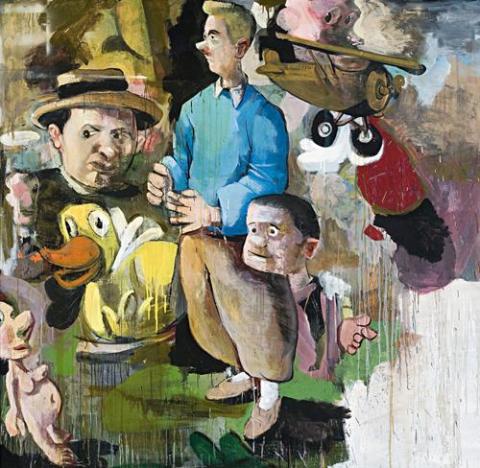VANITY FAIR, 2002
Mclean Edwards
oil on board
186.0 x 186.0 cm
signed, dated and inscribed verso: Vanity Fair / McLean 2002 / m
Martin Browne Fine Art, Sydney
Private collection, Sydney
Martin Browne Fine Art, Melbourne Art Fair, Melbourne, 2002 (label attached verso)
'I think painting has never been more important than now. What I'm talking about is what I feel when I paint. It's a self-conscious process and not an artistic performance.'1
Born in Darwin in 1972, McLean Edwards studied at the Canberra School of Art before holding his first solo exhibition at Legge Gallery, Sydney in 1995. Subsequent solo exhibitions including his Silly Boy Paintings, 1996; I Wanted to be Normal for You, 2000; and Down and Dirty for the Lord, 2003, have not only attracted widespread acclaim, but served to establish Edwards as one of the leading figurative painters in contemporary Australian art. Notably, in 2001 he was invited to participate in the Sulman Prize organised by the Art Gallery of New South Wales, and in both 2004 and 2006, exhibited works in the prestigious Archibald Portrait Prize.
First exhibited by Martin Browne Fine Art at the Melbourne Art Fair in 2002, Vanity Fair, 2002 illustrates well the humorous, caricature-like portraits for which Edwards is renowned. Stylistically, the work reveals the influence of William Dobell - the solemn elongated faces of his subjects an obvious reference to the modernist's controversial Archibald portrait of Joshua Smith - as well as allusions to the grand tradition of European art, from Old Master portraiture to nineteenth-century social realism. Thus imbued with a certain universality, perhaps not surprisingly his portraits have been perceived as exposing 'an essential vulnerability of the human condition', his comic sense of social realism presenting 'individuals as if refugees of a bygone era - floating anchorless in today's ostensibly classless society.'2
Yet if Edwards references the history of figurative painting, he nevertheless departs from its premise of literal or symbolic meaning. Featuring an assortment of seemingly unrelated figures, together with an arbitrarily-placed duck and the mandatory aeroplane, indeed Vanity Fair deliberately eschews any narrative content which one would ordinarily seek from such a figurative work. As Andrew Frost observes, 'We always seem to expect representational art to tell us a story, that each of the elements add up to an explicable sequence of events attached to a meaning or point. Edwards' work has always denied that kind of experience. He pours the images into the paintings without reference to a literal or symbolic narrative. I think of the works as records of an inner monologue, a series of statements without words, records of the long march of the artist's imagination.'3
1. Edwards cited in McLean Edwards: Paintings 1993-2002, Martin Browne Fine Art, Sydney, 2002
2. Sydney Morning Herald, 10 February 1995
3. Frost, A., 'Imaginary Friends', essay accompanying the exhibition McLean Edwards: Mexican Brides, Martin Browne Fine Art, Sydney, 2004
McLean Edwards is represented exclusively by Martin Browne Fine Art, Sydney
VERONICA ANGELATOS
